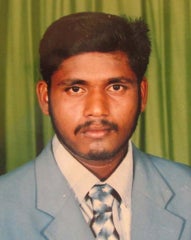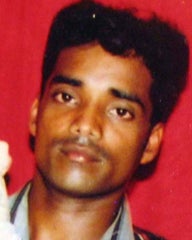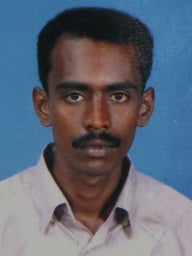The report "Recurring Nightmare: State Responsibility for 'Disappearances' and Abductions in Sri Lanka" contains detailed descriptions of 99 cases of “disappearances” and abductions documented by Human Rights Watch. Here are four of those cases.
Thilipkumar Ranjithkumar
 Thilipkumar Ranjithkumar |
On the morning of December 8, 2006, the Sri Lankan military conducted large-scale cordon-and-search operations in several villages in Valvedditturai area in northern Jaffna district. The wife of 25-year-old Thilipkumar Ranjithkumar told Human Rights Watch that four soldiers searched their house and checked the ID cards of family members. They returned her card, but seized Ranjithkumar’s and told him to come later that day to Navindil to collect it.
Ranjithkumar’s wife took their two children and accompanied her husband to Navindil. She said there were almost 2,000 people at the area where the military told them to come—men with their families who had come to collect their IDs. The military personnel were calling out people’s names, asking some questions, and returning their ID cards. She said that they also called Ranjithkumar, checked his documents again, and let him go. However, he never left the area. Ranjithkumar’s wife said:
He got his card back, and was making his way through the crowd. There were two Powell vehicles parked there, and as he was passing in between them, several military personnel jumped off the vehicle, picked him up and pushed him inside. It all happened in front of my eyes—I stood with the kids some ten meters away. I ran there, screaming, “Where are you taking him? Please, let him go!”
In response, one of the soldiers unfastened a strap from his gun, and lashed me, saying, “Go away, he is not here; if you lost your husband, go and ask the police.” I kept crying, asking them to either release him or take me and the kids as well, “because we wouldn’t survive without him anyway.” One of the soldiers, moved by my tears, got inside the vehicle and I heard him talking, but he did not come back to us.
Ganesh Suventhiran
 Ganesh Suventhiran |
Ganesh Suventhiran, age 23, also had his ID card confiscated on the morning of December 8, 2006, in his home village of Naachchimaar, northern Jaffna district. He also went to Navindil to pick up his card.
His wife told Human Rights Watch that she came there some time later and although she had to wait behind the fence, she saw her husband, who waved to her. She said that the military personnel checked his ID again and returned the card, allowing him to leave. However, as he was leaving two soldiers picked him up and put him into one of the Powell vehicles. Suventhiran’s wife said she then immediately ran to the vehicle, and, along with Ranjithkumar’s wife started begging the soldiers to release the men. She said that the soldiers kept pushing the women away, saying they would hit them if they came closer.
The women said that some 15 minutes after their husbands had been put into the Powell, the vehicles quickly drove off, and other personnel followed them. The two women told Human Rights Watch that they managed to write down the license plate numbers of the two Powell vehicles, 40041-14, and 40032-14.
The wives of Ranjithkumar and Suventhiran immediately went to file a complaint at the Point Pedro police station located inside the Point Pedro military camp. Suventhiran’s wife said:
We gave them the vehicle numbers we wrote down, but they said, “We have hundreds of vehicles with the same numbers, so it is childish of you to expect us to find them by these numbers.” The next day, when we came back, we saw both vehicles leaving the camp and coming back. We told the policeman, and also talked to a female military officer who wrote something down. Then a commander—he had stars on his epaulets and a red band on his arm—came; he talked to us and to the female officer, but never returned to us. They said they did not know anything and sent us to the Valvettiturai police station.
The Valvettiturai police registered the complaint, but advised the women to search for the men in the forest; they mentioned that previously a man taken away by the military had been dumped in the forest, blindfolded, yet alive. The families, however, did not find their husbands there.
The two women told Human Rights Watch that they kept visiting Point Pedro and Polikandy military camps, and that on Christmas day 2006 the military personnel from the Polikandy camp came to verify the places of residence of the two men with their village leaders. The soldiers, however, kept denying having any knowledge of the men’s whereabouts. The women also reported the “disappearances” to the Human Rights Commission of Sri Lanka, International Committee of Red Cross (ICRC), and the Sri Lanka Monitoring Mission. The ICRC inquired with the military, the women said, but received the same response.
To date the fate and whereabouts of the two men remain unknown.
Balendran Ratheeskanth
 Balendran Ratheeskanth |
In December 2006, 27-year-old Balendran Ratheeskanth moved from Vavuniya to Colombo in the process of migrating to the United Arab Emirates for work. He obtained the necessary work and travel permits, and had a ticket to fly out of Colombo on January 23, 2007.
According to Ratheeskanth’s mother, who had spoken to his landlord, at around 2:30 p.m. on January 13, 2007, six unarmed men arrived in a blue van at his boarding house in Colombo. The men identified themselves as CID officers and presented their identity cards. They said they had to take Ratheeskanth away. The landlord repeatedly asked them why and where they were taking Ratheeskanth, but they did not reply and forcibly took Ratheeskanth away.
Ratheeskanth’s mother told Human Rights Watch:
Normally my son called me every evening. But that evening I did not receive a call so I got worried. I called the landlord of the boarding house and he informed me about what had happened. The same night I got on a bus from Vavuniya and came to Colombo.
Ratheeskanth’s mother filed a complaint with the police; she also inquired at the CID office at Dematagoda about her son. The police and the CID denied having any knowledge of the arrest. At this writing, Ratheeskanth is still missing.
Danesh Amarthalingam
On February 19, 2007, 20-year-old Danesh Amarthalingam from Kiliveddi, Trincomalee district, was traveling with his aunt by bus to Batticaloa, trying to leave the area before ongoing fighting intensified. His aunt told Human Rights Watch that as the bus made a lunch stop near Welikanda town in Polonnaruwa district, two men who sat next to Amarthalingam on the bus started making frantic calls on their cell phones, pointing at the young man. As passengers boarded the bus, the two men were joined by a third one, in a T-shirt and army trousers.
Amarthalingam’s aunt told Human Rights Watch:
We all got back on the bus. The bus drove for about 10 kilometers from our lunch stop when a white van coming from the opposite direction swerved and blocked the bus. The bus came to a halt. One man came out of the van and stood outside the van, blocking the registration number from view. About nine men got into the bus. They told the driver, “Don’t shout,” and “Keep quiet.” At this point, the three men who had kept an eye on my nephew once again pointed towards him and got off the bus.
One of the men was masked. He grabbed another boy, who was traveling with us, and my nephew by the collar and dragged them out of the bus. The boys were very scared. They did not say anything. I kept quiet because I was also very afraid they would shoot my nephew. They all had weapons. They said, “If anyone shouts, we will kill these two boys.” The other boy’s mother managed to be dragged outside along with her son. She was shouting and screaming but nobody helped her. The van sped off.
The bus driver stopped the bus at a police checkpoint and told the policemen about the incident. The policemen told the bus driver, “We can’t open a file here. Go and tell Valachchenai police station.”
The aunt said that the incident took place in the government-controlled area where the Karuna group also operated freely. She reported the abduction to the ICRC. To date she has not received any information about Amarthalingam.








